| |
I was probably too young to see the film, Odette, when it was first shown in cinemas in 1950. However, I did see it and was greatly moved and very upset by it. I was extremely disturbed that the lady in the film was being tortured despite my knowing that it was a film about the war.
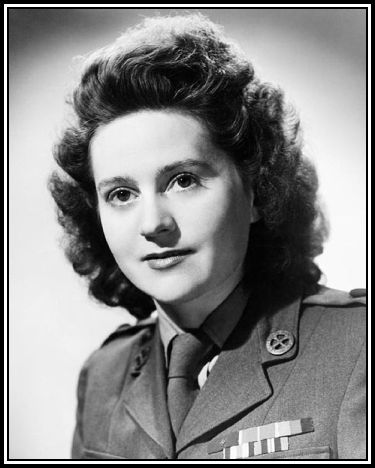
In 1950, the war was still very much a part of life. Life had a drab look and there were still shortages and rationing to endure. Also, inflation was lifting its ugly head to add to the difficulties of our lives. Bombed sites still existed in London and were especially noticeable in the East End and in the City of London. Despite the difficulties, life went on and, as usual, people made the best of it and carried on.
For some reason, I remember begging and begging my parents to take me to see Odette. I think that the kids in my class must have seen it and were talking about it. Naturally, I wanted to see it too. My parents told me that it was something that would upset me and that I was too young to see it. Not being daunted, I kept up my request and eventually I was taken on a Saturday afternoon to see it at the ABC Mile End Road.
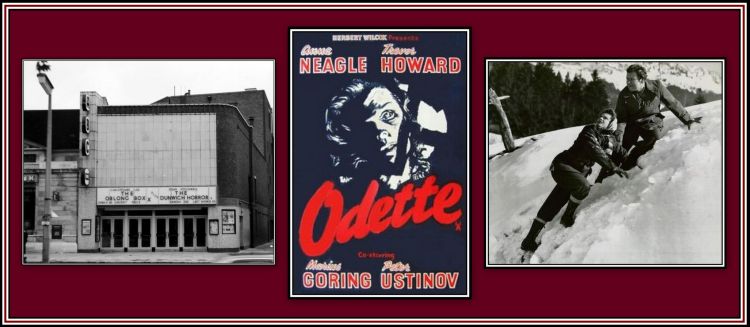
My parents opened the pie ‘n’ mash shop at 11 a.m. until 3 p.m. and then again between 5 p.m. and 11 p.m., Monday to Saturday except for Thursday evening. The shop was closed all day on Sunday. We used to go out on Thursday evenings and generally went either to the Hackney Empire or to the cinema. From time to time, we went to the theatre in the West End, which was a great treat for me. Since we had already gone out on the Thursday evening of the week that Odette was showing in North East London, my only chance of seeing the film was on Saturday afternoon.
Films, once they had been showcased in the West End cinemas went on General Release. This meant that they were shown in a series of cinemas throughout the country. In London, films were shown firstly in the boroughs of North West London for one week. Next they were shown in cinemas of North East London and then finally in those of South London. Films followed this circuit and it was a rare film that was either brought back or had its run extended beyond the usual one week of showing. I remember that The Great Caruso returned for a second week and we went during both weeks to see it since my parents, especially my father, were great Mario Lanza fans. Only once did I note a film being removed from circulation before its week was up. I recall that it was a musical, but its title escapes me at present.
My nagging was rewarded and my poor mother said that she would take me to see Odette on Saturday afternoon, but with the proviso that should she find any scene to be too violent, we would leave the cinema. She made me promise that I would not make a fuss should this prove to be the case. Naturally I promised, but despite this, I had every intention of making a fuss should this happen. This makes me sound like a horrible child, but it should be remembered that going to the cinema was very important to me, even at that young age, and I did not want to miss this film no matter what. After all, I wanted to enter into the discussion with the other critics at school!
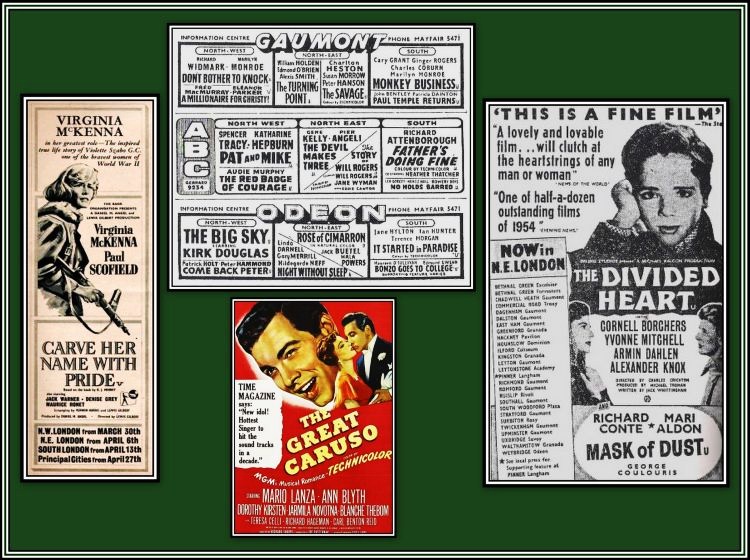
I remember that we went into the cinema while the supporting film was still playing. When I was a child, films were screened in continuous performance and people went into a cinema when they chose, no matter if the main film had already started and left when the film reached the point where they came in. The audience managed to piece together the story line and obviously knowing the ending did not seem to spoil their enjoyment of the remainder of the film. Naturally, many would sit through part of the film that they had already seen and leave when the film came to the end. I would always try to get my parents to do this, but generally my father would want to leave since the public houses closed at 10.30 p.m. in those days and he wanted to have a drink or two before going home.
The film was in black and white, which at my young age and with my lack of sophistication was a disappointment. Like most of my friends, we considered such films inferior and lacking in quality. We were very dismissal in those days. The film was also English! This was another deathblow for the film. We were irritated by the stilted and clipped way the actors spoke in such films. The principals were always upper class and sounded extremely toffee-nosed to us kids of the East End. Only crooks and subordinates spoke as we did. We also did not like films that were too wordy. We wanted action. We wanted chases and battles. I preferred Indians and always liked it when they won a battle. Sadly, they were generally defeated at the end, much to my chagrin. Despite having dragged my mother to see the film, it seemed that it was already doomed in my eyes even before the credits had finished rolling.
|
---ooOoo--- |
The film starred Anna Neagle as Odette. Ms Neagle prepared for her role by spending a year in the company of the real-life Odette and visiting the prisons and camps where she had been held. According to reports Ms Neagle was greatly affected by the film.

The film also starred Trevor Howard, Peter Ustinov, Bernard Lee and Marius Goring. Odette was directed by HerbertWilcox who had married Ms Neagle in 1943 and had directed most of her earlier films.
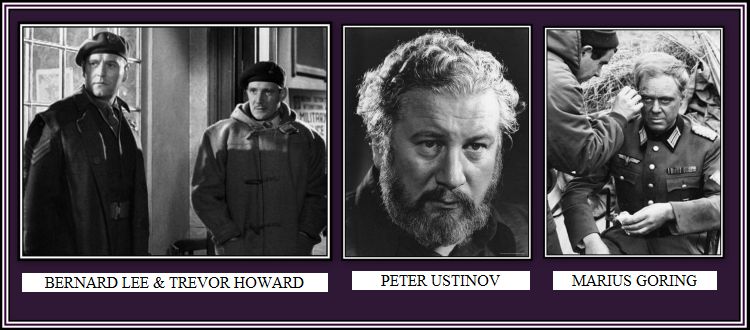
Trevor Howard played Captain Peter Churchill in the film. He was an excellent actor who came to prominence as the doctor in Brief Encounter. I remember seeing him in The Third Man, where he played the English major determined to trap Harry Lime. I don’t think I ever saw him give a bad performance in any film of his. Sadly, I am convinced that his full potential as an actor was only recognised by a few film makers.
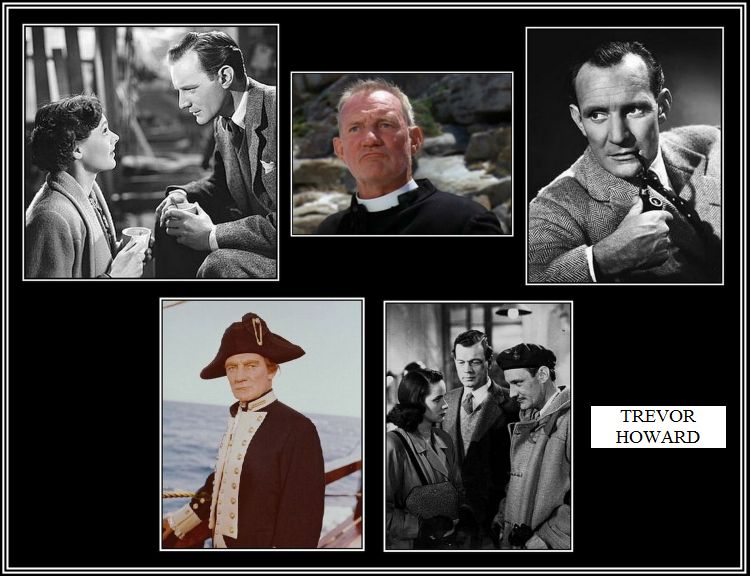
Peter Ustinov had an illustrious career both in film and on the stage as an actor and playwright. He won the Best Supporting Oscars for his roles in Spartacus and Topkapi. He was also a wit and a great raconteur. I especially enjoyed his interpretation of the Emperor Nero in Quo Vadis and still laugh whenever I hear him call for his tear glass.
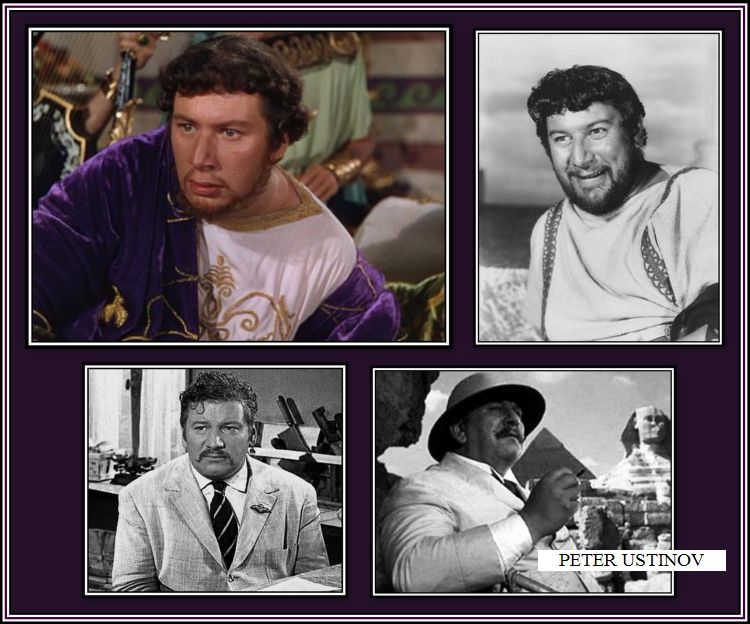
Bernard Lee became a great character actor and appeared in a number of films. He went on to play M in the James Bond films from their beginning in 1962 until 1979. He also appeared in The Third Man and in the little known film, Whistle Down the Wind, playing the father of Hayley Mills’ character.

Marius Goring was an underrated actor who nonetheless had a long and celebrated career. Perhaps his greatest successes came with the film, The Red Shoes, where he played the young composer who fell in love with a future prima ballerina played by Moira Shearer. He often played German officers in a number of films and later worked mostly in television.
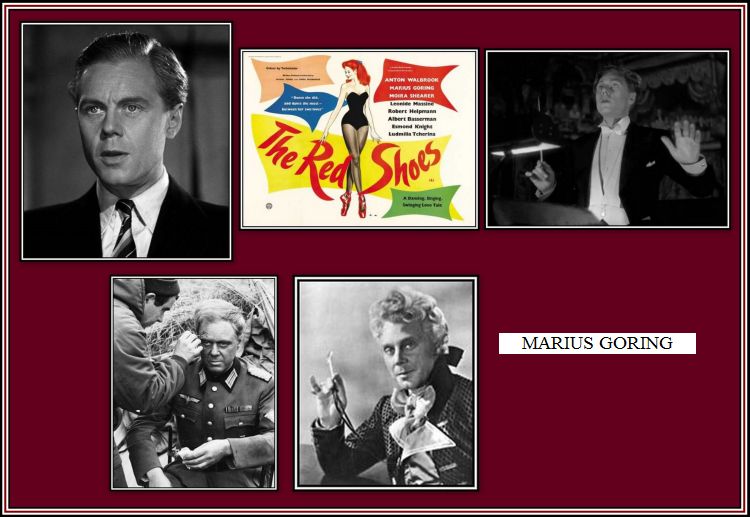
Anna Neagle enjoyed a very successful career prior to the making of Odette and received great acclaim for both her film and stage work. Her first major stage success came in 1931 when she appeared with Jack Buchanan in the play, Stand up and Cheer. She was noticed by the producer/director Herbert Wilcox who immediately starred her in his musical, Goodnight Vienna (1932), also with Jack Buchanan. This film was a great success and led to her making many more films with Herbert Wilcox.
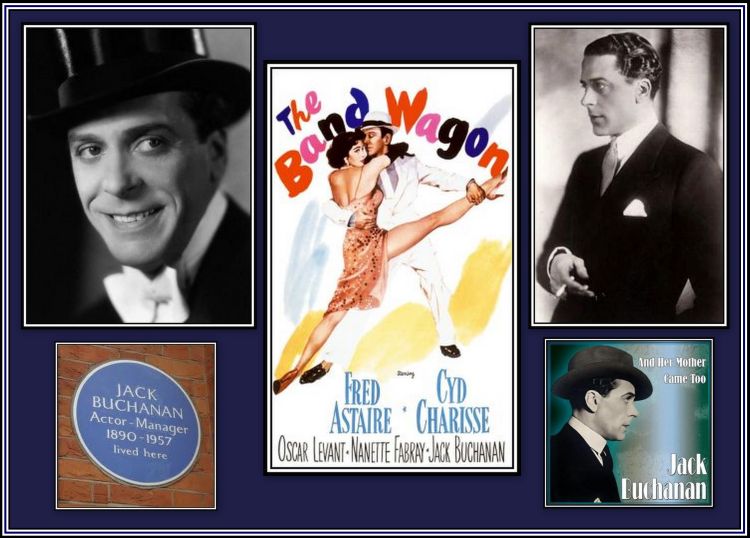
Besides appearing in film musicals, Ms Neagle also specialised in playing figures from history. These included roles as Nell Gwen (1934), Peg Woffington in Peg of Old Drury (1936) and twice as Queen Victoria with Anton Walbrook as Prince Albert, first in Victoria the Great (1937) and, as a result of this film receiving great international acclaim, in Sixty Glorious Years (1938).
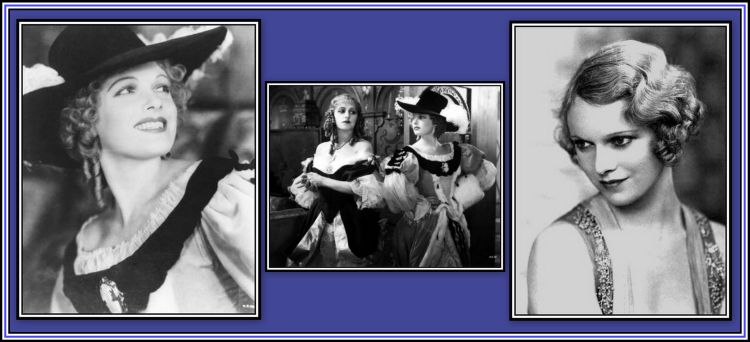
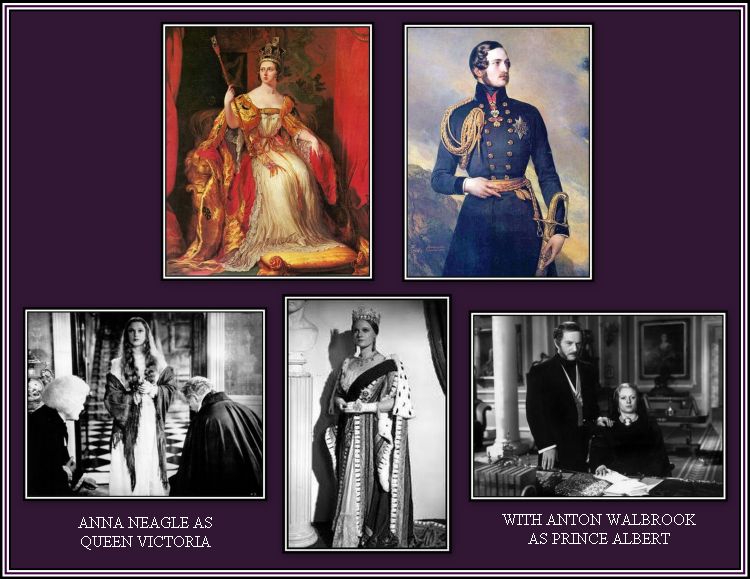
Following the success of Victoria the Great, Ms Neagle and Mr. Wilcox went to Hollywood and made a series of films with RKO Radio Pictures. Her first role was as Nurse Edith Cavell, the heroine of World War I, who was shot by the Germans for spying. She went on to make three musicals following this: Irene with Ray Milland (1940), No, no Nanette with Victor Mature (1940) and Sunny with Ray Bolger (1941).
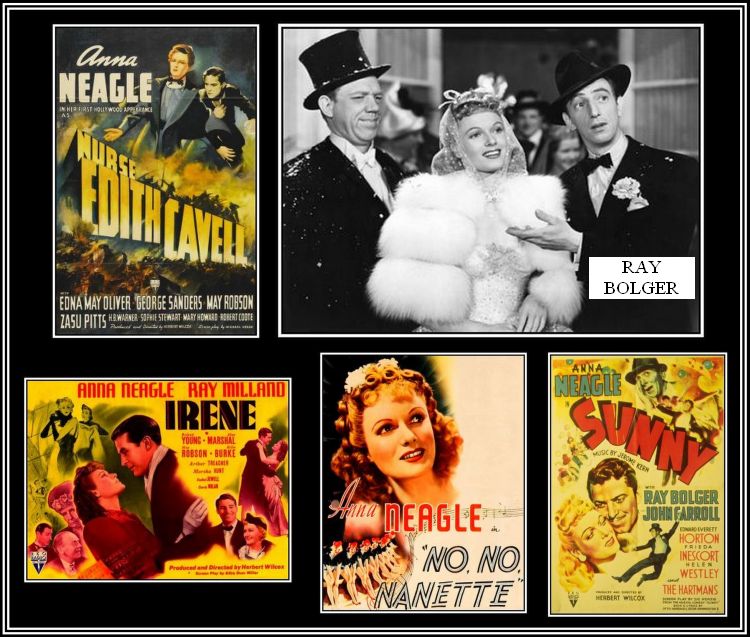
Ms Neagle returned to England and immediately began making films, including the story of Amy Johnson, the British aviatrix. Later she made a series of films with Michael Wilding, which collectively became known as the London Series. These films did well both financially and critically causing them to be called the greatest team in British films. I have to smile at this accolade as my mother was not a great lover of these films. She especially did not like Michael Wilding and, sadly, having seen some of his films on television, I cannot say that I am particularly impressed with his acting skills.
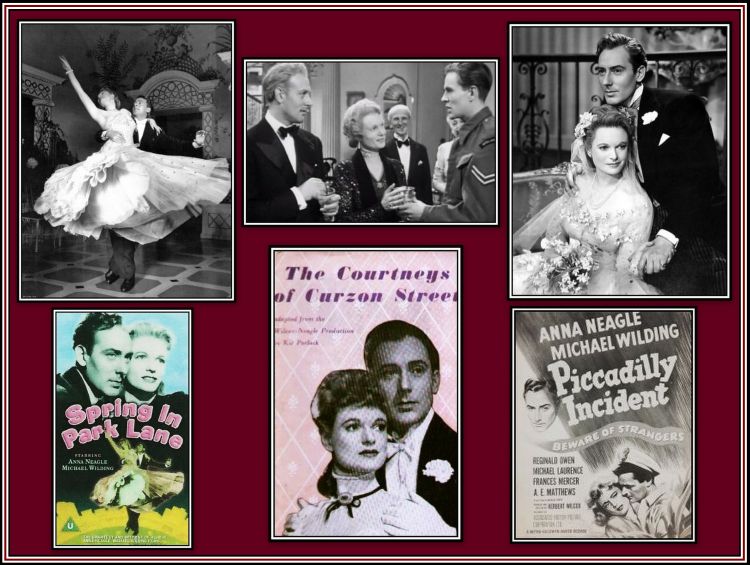
By 1950, Ms Neagle was Britain’s top cinema box office draw and was the year she made Odette.
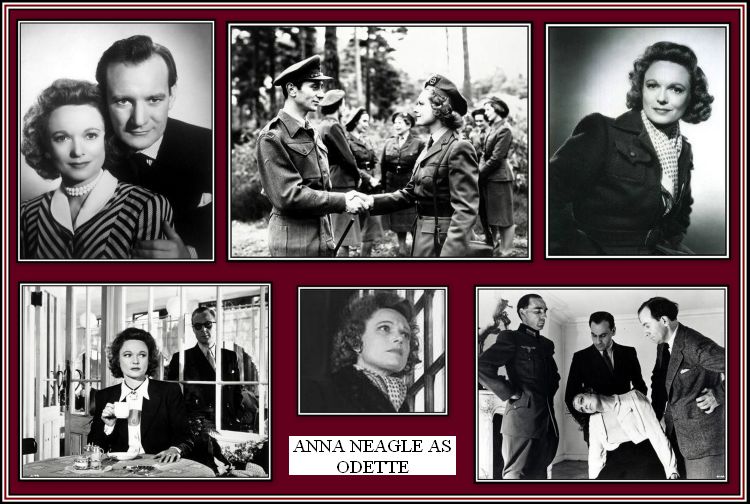
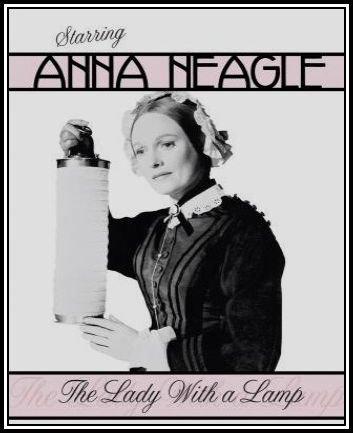 In 1951 she played Florence Nightingale in The Lady with the Lamp. I remember seeing this film and was greatly impressed by it. It told the story of the great nurse who revolutionised the profession when she set up a hospital on the Asiatic side of Istanbul during The Crimean War. I found the final scene too sad and could not stop myself from crying. The scene showed an aged Ms Nightingale being given the news that the Queen had awarded her the British Order of Merit. Ms Nightingale was overcome by the honour and kept repeating the words, very kind ……… very kind. This proved too much for me! The film ended at this point and, quite abruptly, the proscenium curtains swung across the screen and the house lights went up. I was mortified! Mind you, I was not the only person crying, but at my young age I was embarrassed beyond words and immediately dove under my seat and stayed there much to my parents’ annoyance. Since that time, I have advocated that cinema house lights should not be allowed to come up until a suitable time has passed after a film ends. In 1951 she played Florence Nightingale in The Lady with the Lamp. I remember seeing this film and was greatly impressed by it. It told the story of the great nurse who revolutionised the profession when she set up a hospital on the Asiatic side of Istanbul during The Crimean War. I found the final scene too sad and could not stop myself from crying. The scene showed an aged Ms Nightingale being given the news that the Queen had awarded her the British Order of Merit. Ms Nightingale was overcome by the honour and kept repeating the words, very kind ……… very kind. This proved too much for me! The film ended at this point and, quite abruptly, the proscenium curtains swung across the screen and the house lights went up. I was mortified! Mind you, I was not the only person crying, but at my young age I was embarrassed beyond words and immediately dove under my seat and stayed there much to my parents’ annoyance. Since that time, I have advocated that cinema house lights should not be allowed to come up until a suitable time has passed after a film ends.
In 1957, Ms Neagle made her final film, The Lady is a Square, which did not generate much interest. She and her husband had begun producing films in the mid-1950’s, which were poorly received and in 1964, Mr. Wilcox declared bankruptcy.
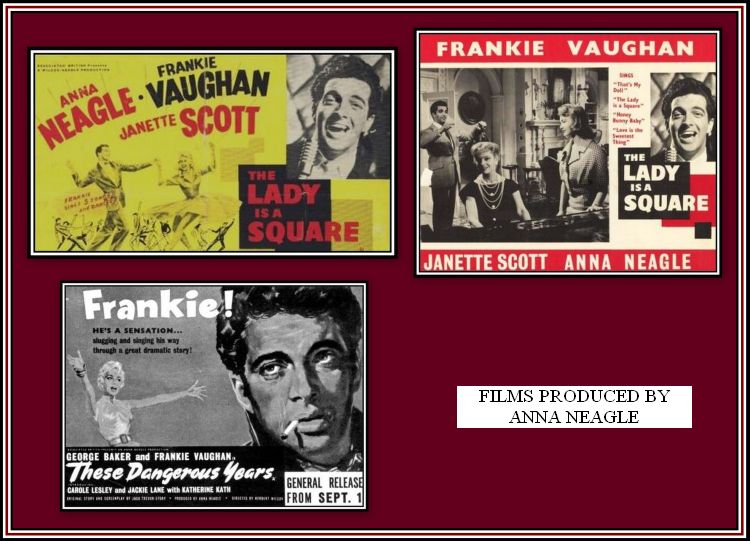
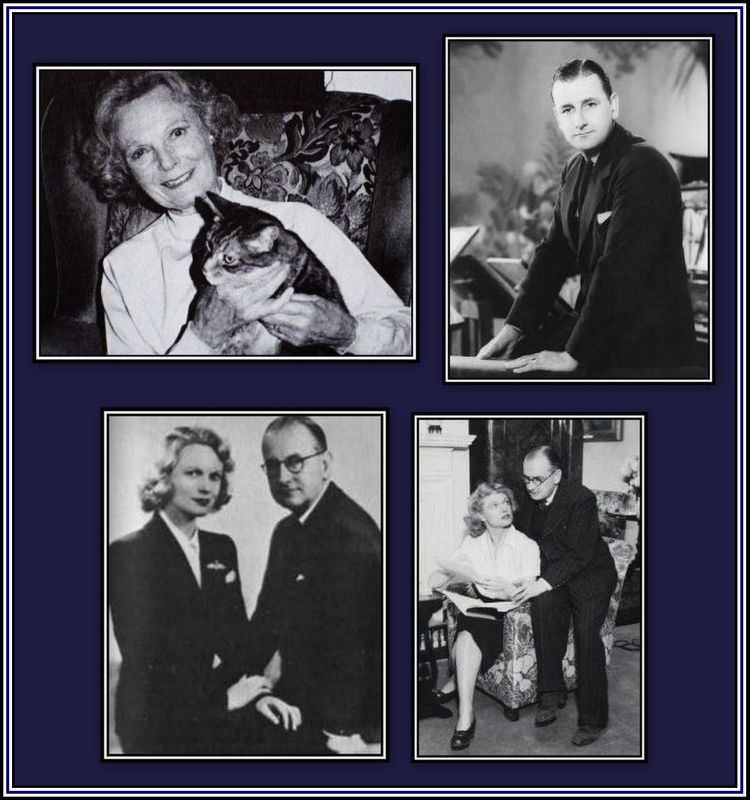
Ms Neagle returned to the stage in 1965 and made a spectacular comeback in the musical Charlie Girl, which ran for 2,047 performances in London. She went on to tour with the company in both Australia and New Zealand. In 1973, she appeared in the London revival of No, No Nanette, repeating the role that she had played on screen in 1940 and continued to work on the stage following her husband’s death in 1977. In 1985, she played the Fairy Godmother in the pantomime, Cinderella, at the London Palladium despite suffering with Parkinson’s Disease.
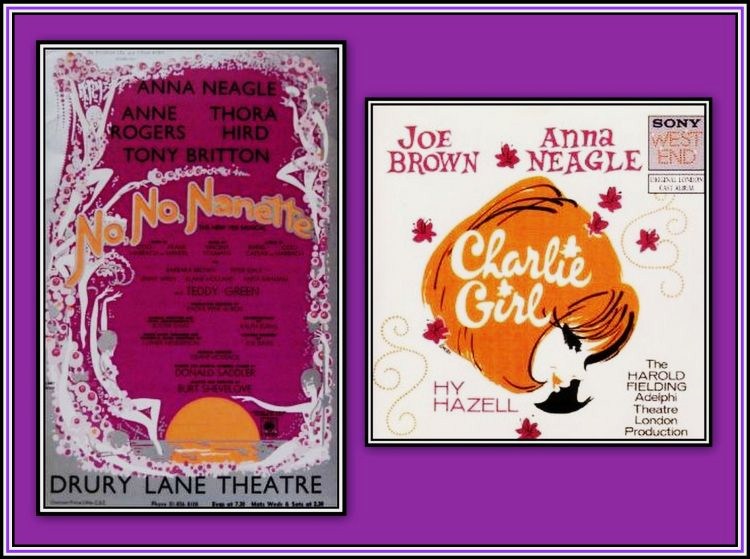
Ms Neagle died in 1985 at the age of 81 and was buried beside her husband at the City of London Cemetery. She had been created a Commander of the Order of the British Empire (CBE) in 1952 and a Dame of the Order of the British Empire in 1969.
|
---ooOoo---
|
I have to admit that once the film began, despite my earlier misgivings, I was quickly drawn into the story. The film was set during World War II and told the story of a young woman, Odette Sansom, who joins the Special Operations Executive, which specialised in work behind enemy lines. After her training, she is sent into occupied France to work with the Resistance. Eventually she is captured and taken to prison and then to a concentration camp. She is tortured by the Gestapo, but refuses to talk and give up her colleagues. The sight of Odette after she had been tortured really upset me and I could not help crying. My mother wanted to leave, but I would not go. I did in fact make a small fuss, but promised to be quiet. Fortunately, I managed to stifle my cries by stuffing my handkerchief into my mouth. Luckily there was no one sitting next to us or in the rows immediately in front or behind us. I think that had there been others close by my mother would have picked me up and carried me out. Anyway, I controlled my emotions until the film’s end when they overtook me again despite Odette surviving her imprisonment and torture.
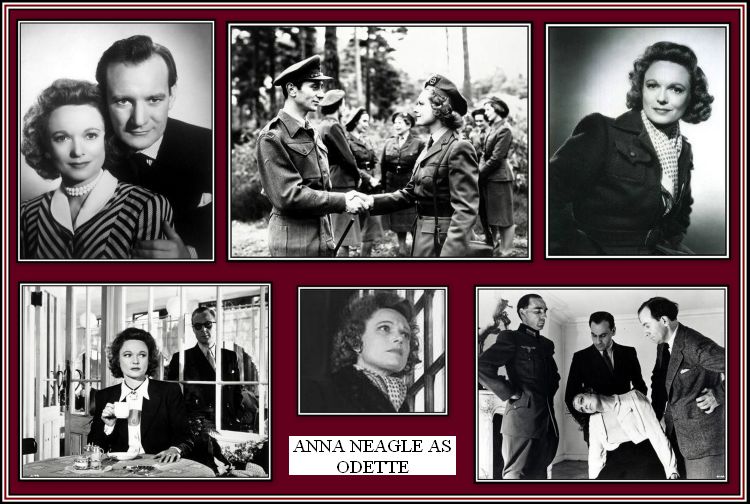
Once the film ended, my mother said that we had to leave. However, I remember that we did not get up immediately and continued to sit in our seats for a while longer. I expect that my mother was much affected by the film and also needed to wipe her eyes before getting up. I am also sure that she was embarrassed at the thought of walking up the aisle after having brought me, at such a young age, to see the film. She obviously regretted having done so and dreaded having to suffer the looks of scorn from others who no doubt would be thinking her a terrible mother for allowing her child to see the film. My mother was acutely aware of other people responses, having had to suffer them often when she was a child.
Mercifully, I remember that as we walked up the central aisle of the cinema, just about every woman and child in the audience were crying, some quietly, others loudly, and happily little attention was paid to us. Seeing others opening weeping helped me to bring my own feelings under control, but only just. I was surprised to see that I had not been alone in being upset by the film.
Once outside, we were dazzled by the late afternoon sun. I remember my mother complaining how much she disliked going to the cinema during the afternoon since she always developed a headache when she came out. I had to admit that she had a point.
As we walked home along the Mile End Road, I had a hundred questions about the film. My mother did her best to answer them, but in the end she said that we would have to go to the Library and find out more about this lady. During the following week, we went to the Bethnal Green Library and one of the people working there found some information for us and I managed to read what I could about Odette. My mother said that she was the bravest woman that she had ever heard of and said that it was a miracle that she survived the misery of the concentration camp. I remember her telling me that my father had been amongst the troops liberating the Bergen-Belsen Concentration Camp on 15th April, 1945 and that he had difficulty talking about the things that he had seen.
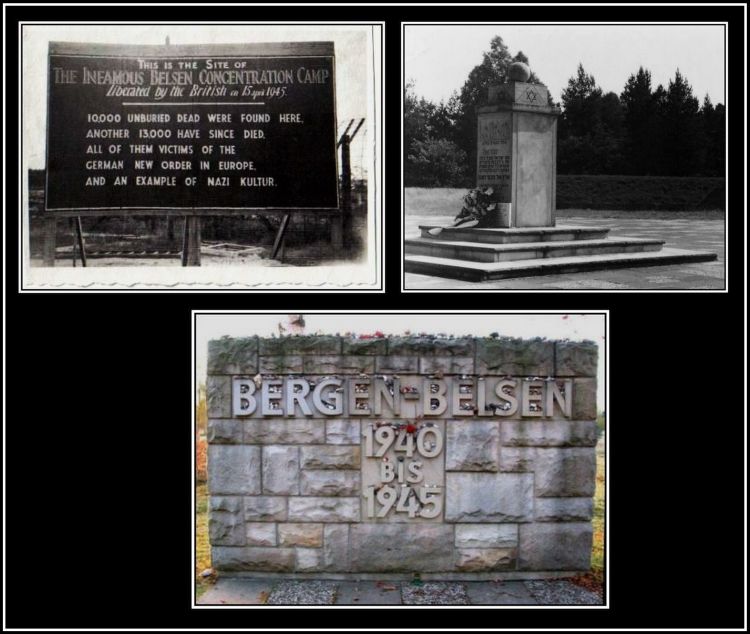
Although I can only remember a few details of the film, what I do remember centres around Odette’s time in prison and in the concentration camp. What remains vivid in my memory is how she looked after being tortured. I also remember how much I disliked the Gestapo officials for their vicious behaviour towards such a brave woman and it took me several years to dissociate poor Marius Goring from his role in the film. Despite my memory of the film being somewhat sketchy, my admiration for Odette has not waned.
|
---ooOoo---
|
Odette Brailly was born on 28th April, 1912 in Amiens, France. Her father was a World War I hero who had been killed at Verdun in 1918. She contracted Polio when she was seven-years of age and was blind for a year and spent two years being unable to move her arms and legs. In 1931, she married an Englishman, Roy Sansom, whom she had met in Boulogne. The young couple moved to England where they had three daughters. Her husband joined up in 1940 leaving her to bring up their daughters in his absence. In 1942, the Admiralty requested postcards and photographs taken in and around Boulogne. She wrote a letter in response to say that she had such photographs, but made an error and addressed it to the War Office in error. After interviews and discussion, her mistake led to her being enrolled in Special Forces of the First Aid Nursing Yeomanry (FANY) and received training from the Special Operations Executive. This led to her being sent to Nazi-occupied France where she worked with the French Underground and where she was given the codename, Lise.
In 1942, she parachuted into France making her landing near Cannes. She brought funds for her supervisor, Peter Churchill and acted as his courier. The network under Churchill’s direction was betrayed and on 16th April, 1943 Odette and Peter Churchill were arrested. They were sent to Fresnes Prison in Paris where they underwent interrogation and torture by the Gestapo. She refused to name her accomplices despite receiving heinous treatment. She did tell the Nazis that she was the wife of Churchill and that he was the nephew of Winston Churchill. This was done in the hope of receiving less harsh treatment from her captors.
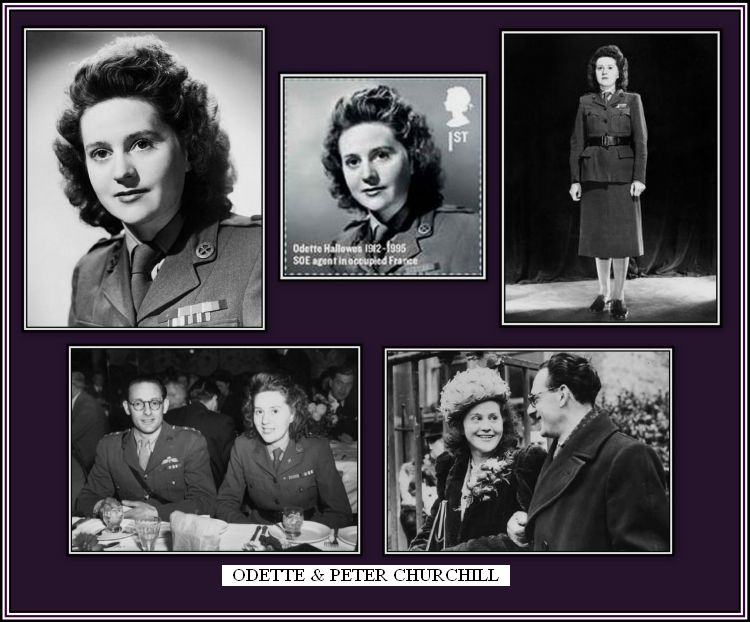
Odette was eventually condemned to death in June 1943 and sent to Ravensbruck Concentration Camp. Apparently no date was set for her execution and once the war was over, the camp commandant brought her with him when he surrendered to American forces hoping that her supposed connections to Winston Churchill might help him escape execution. Later in 1946, she gave testimony against the prison guards at the War Crime Trials.
During Odette’s imprisonment, her husband died. In 1947, she married Peter Churchill, but the couple divorced in 1956. She later married Geoffrey Hallowes and they remained together until 13th March, 1995 when she died. Odette was 82 years of age at the time of her death.
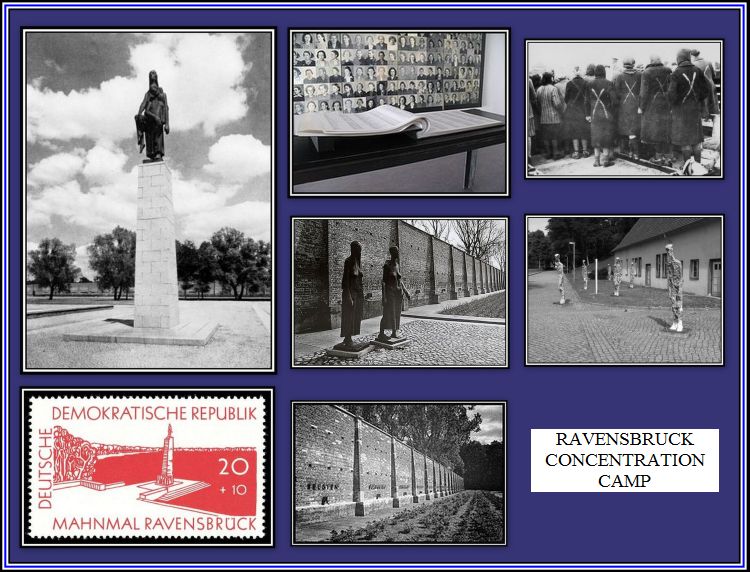
Odette was created a Member of the Order of the British Empire (MBE) and was also awarded the George Cross for her valour. She was the only one of the three FANY members of World War II who was awarded the George Cross and survived the war to be able to receive her award in person. She was also made a Chevalier de la Legion d’Honneur for her work with the French resistance. Apparently her George Cross medal was stolen from her mother’s home, but following an appeal, it was returned together with a note offering an explanation for the theft.
|
|
---ooOoo---
|
I cannot but think of Odette Hallowes other than by her Christian name. I appreciate that she had a surname, but since I first heard of her through the film, Odette, I have always thought of her and referred to her by that one name. I hope that the reader will not find my apparent familiarity offensive. It certainly is not meant to be, as I have the deepest respect for this lady and admire her greatly.
For further information on the life of Odette, please see:
|